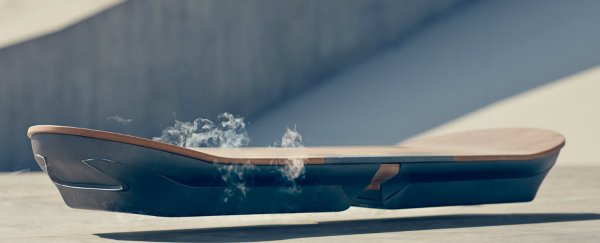Few futuristic modes of transportation attract as much enthusiasm as the hoverboard (except perhaps the jetpack). Since Marty McFly showed off the hoverboard's potential in the Back To The Future movies, we've been patiently waiting for the real-life technology to catch up with the sci-fi vision.
Now luxury car maker Lexus has teased what may be the most authentic hoverboard yet, via the promo video above. It's part the firm's 'Amazing in Motion' series of advertisements, and it shows someone about to step on a levitating hoverboard that looks like it's dropped straight out of 2115.
Lexus says the board is "real" and "rideable", but with so little to go on, it's not certain just how genuine this device is. It looks a lot more polished than some of the other prototype hoverboard technology we've seen to date, but extra-strong magnets - on which most hoverboard inventions are based - are incredibly difficult to balance. Repelling magnets also need to be fitted to the floor, which rules out any adventures in a regular skate park.
"Wrapped in a design that is uniquely Lexus, the hoverboard features the iconic Lexus spindle grille signature shape, using materials found in the luxury car brand, from the high tech to the natural bamboo," explains the accompanying promotional page. The manufacturer says the hoverboard uses superconductors cooled by liquid nitrogen, which explains the smoky vapour coming off the board.
Right now, that's all we know - Lexus has promised to post regular updates on the progress of the project in the coming weeks. We'll have to wait and see exactly how it works, how independent it is and (crucially) whether we can buy one.
Canadian Catalin Alexandru Duru currently holds the world record for the longest hoverboard flight, managing a distance of 275.9 metres (905.2 feet) last year. His hoverboard is based around a quadcopter, so it's not as sleek or as mobile as the one Michael J. Fox stepped on all those years ago. It's also said to have the ability to fly "dangerously high" and for the time being, there's no word on a finished version of the contraption that might actually go on sale.
Also active in the hoverboard-building game is US-based startup Arx Pax. The company's Hendo Hoverboard uses magnets to stay in the air, but in order to achieve the required stability, travel is restricted to a pre-defined linear track.
It's likely that the creation unveiled by Lexus has some similar kind of restrictions on it - the video doesn't actually show anyone riding the board - but let's hope the technology can be quickly iterated and improved. Once hoverboards are out of the way, we can move on to time travel, flying cars and everything else promised by 1980s blockbusters.
